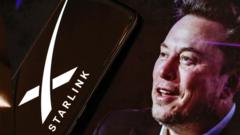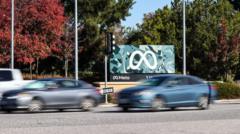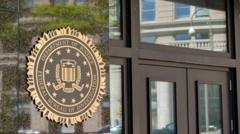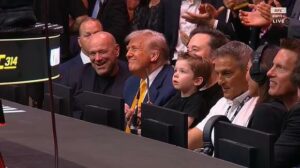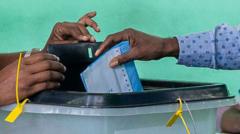Elon Musk's virtual interview with far-right AfD leader Alice Weidel has sparked debate and concern over his influence on German politics.
Elon Musk Dives Deep into Controversial Politics with AfD Leader Alice Weidel
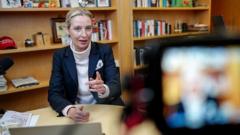
Elon Musk Dives Deep into Controversial Politics with AfD Leader Alice Weidel
In a surprising live session, Musk endorses Germany's far-right party while discussing various contentious topics.
In a striking move that has left many in Germany rattled, tech billionaire Elon Musk hosted a live interview with Alice Weidel, co-leader of the far-right Alternative für Deutschland (AfD), from Berlin. The 74-minute discussion, which aired on Musk's X platform, traversed an array of provocative topics including energy policies, complex bureaucratic practices in Germany, the historical figure Adolf Hitler, and Musk’s vision for Mars. Musk, who is no stranger to controversy, did not shy away from urging Germans to support the AfD in the upcoming elections, marking a clear intervention in the nation’s political landscape.
The much-anticipated event comes amid accusations of Musk's meddling in the impending snap elections in Germany. Conducted in English, this conversation provided the AfD with a unique opportunity to engage with an international audience, a chance not lost on Weidel. She took the moment to vocalize support for U.S. President-elect Donald Trump, affirming her party's stance as "conservative" and "libertarian," despite persistent allegations from mainstream media labeling them as extremist.
While parts of the AfD have been officially designated as right-wing extremist by German authorities, the conversation took an unexpected turn when Weidel controversially asserted that Adolf Hitler was a “communist” and not a conventional conservative or libertarian. She described him as an "antisemitic socialist," a statement likely to ignite further debate regarding historical interpretation around Nazi ideologies.
Amidst a backdrop of shared laughter, Weidel and Musk lamented over Germany’s notorious bureaucracy, criticized the abandonment of nuclear energy, and discussed issues surrounding taxation and free speech. An eyebrow-raising moment came when Weidel posed a question about Musk's belief in God, to which he replied he was open to the concept in his quest to understand the universe better.
Polling notably high, the AfD is currently positioned second in the political landscape, with a snap federal election set for 23 February. However, despite their rising popularity, analysts stress that coalition-building with other parties remains an uphill battle. Meanwhile, Musk's declarations that Weidel is the "leading candidate to run Germany," rooted in his substantial investments in the nation—including a major Tesla manufacturing site just outside of Berlin—have drawn ire from detailed observers of the German political climate.
Chancellor Olaf Scholz expressed nonchalance toward Musk's provocations, even as the billionaire has characterized Scholz's government as foolish. Officials have raised alarms about Musk’s capacity to influence German elections, underscoring the importance of recognizing and navigating misinformation.







